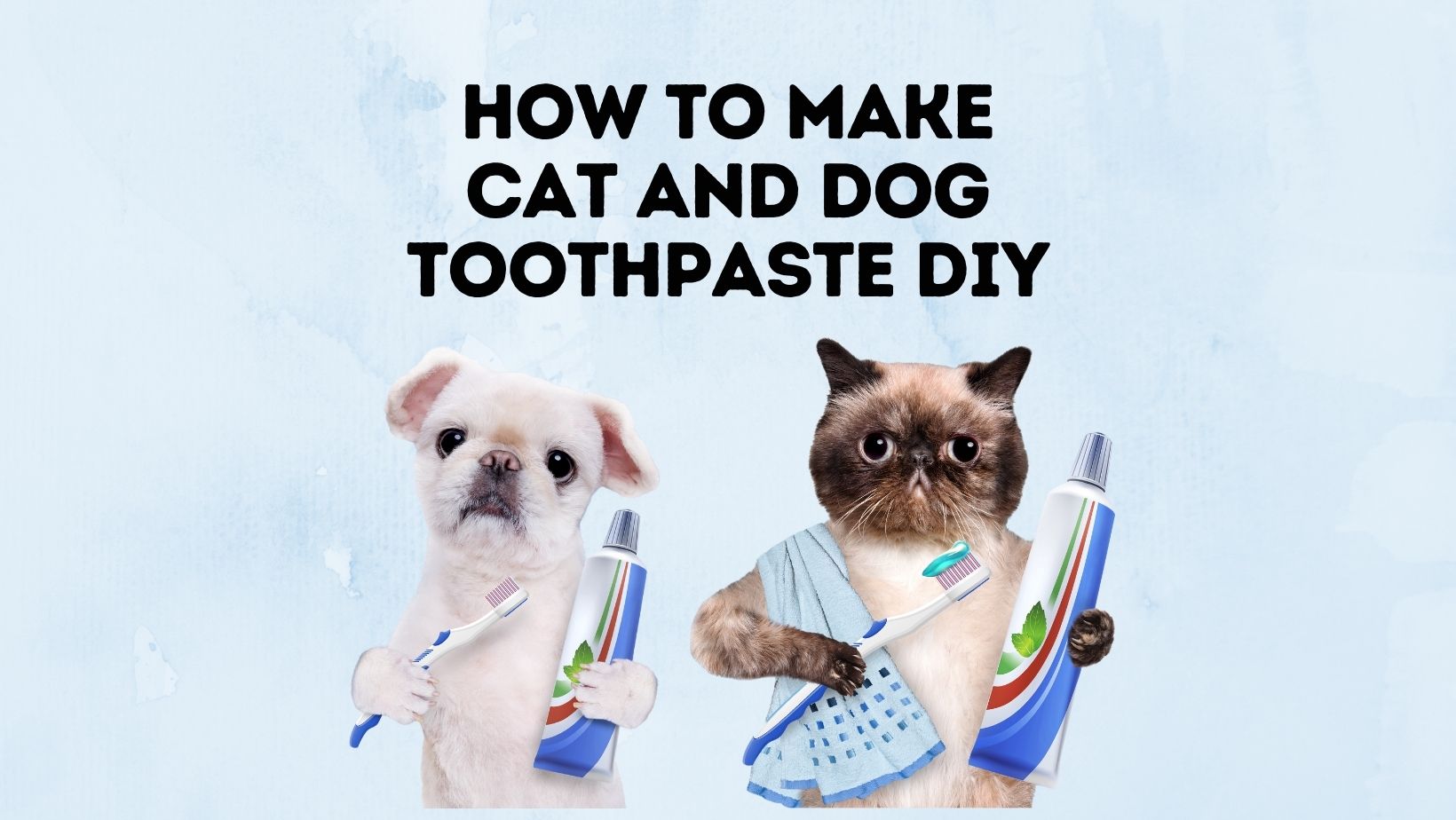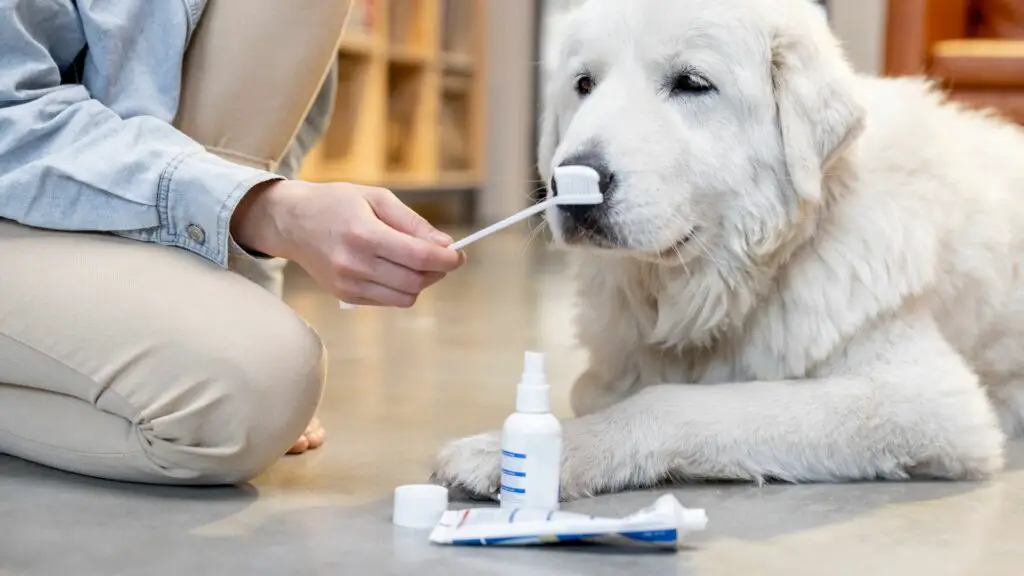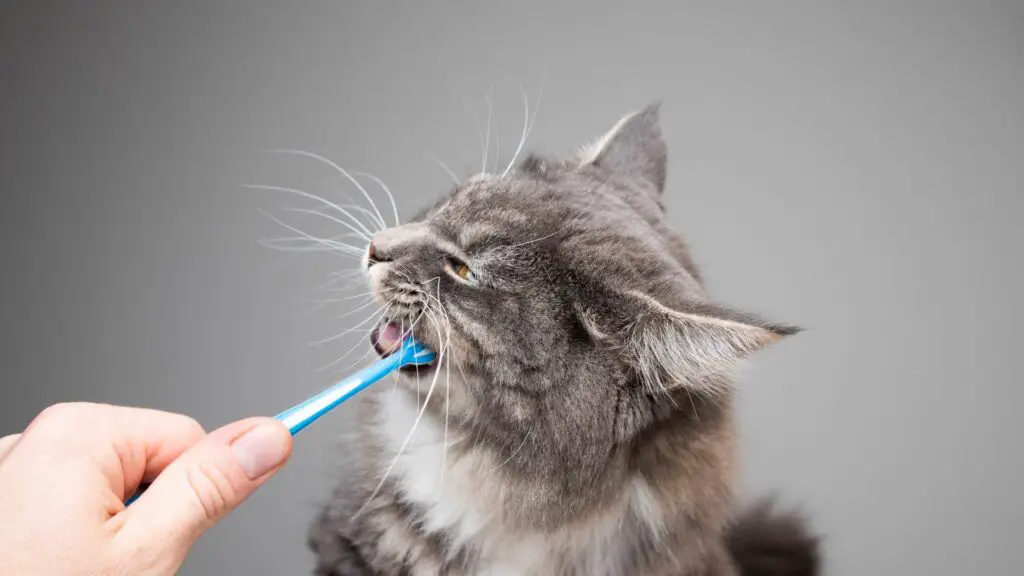
Pet parents can know the importance of maintaining their canine’s overall health. However, while most pet parents focus on their pet’s physical well-being, many often overlook the importance of dental health. Pets like cats and dogs can experience a range of dental problems, including pain, difficulty eating, tooth decay, gum disease, and more. But with regular brushing and dental visits, all these concerns can be resolved.
Yes, even your dog and cat need to have a regular brushing routine. While there are many pet toothpaste options available on the market, pet parents can also make one at home. Making toothpaste at home for your pets can be cost-effective and simple. DIY pet toothpaste ensures that dog and cat parents know exactly what’s going on in their pet’s mouth. It, in addition, eliminates the risks of letting your pet have harmful chemicals in their mouth.
Join us in this article, and we will discuss Ways to make Pet Toothpaste at home. We will disclose multiple methods to DIY Cat and Dog Toothpaste using the safest ingredients. With a little bit of time and effort, you can create a toothpaste that is natural, safe, affordable, and suitable for your pet. So, shall we start?
Table of Contents
4 DIY Pet Toothpaste you should know about right-away
- Coconut Oil and Baking Soda DIY Toothpaste for Dogs and Cats
Coconut Oil and Baking Soda are two natural ingredients that clean your pet’s teeth effectively. The lauric acid in coconut oil has natural antibacterial properties, which aid in killing bacteria that can cause plaque, bad breath, and issues like tooth decay.
Here is how you can make Coconut Oil and Baking Soda toothpaste for your dog:
- Take a small glass bowl and mix 2 tablespoons of coconut oil and 1 teaspoon of baking soda until they combine well. Use organic Coconut oil, and if it isn’t in liquid form, microwave it for a few seconds.
You can use the toothpaste right away and even store the extra in an airtight container at room temperature. However, use the stored one for no more than a few days.
- Turmeric and Coconut Oil DIY Toothpaste for Dogs and Cats
Both Turmeric and Coconut Oil are two natural and safe ingredients to let in your dog’s mouth. While the anti-inflammatory and antibacterial properties of both these ingredients combine, the mixture fights against a range of dental issues.

Here is how you can make Turmeric and Coconut Oil toothpaste for your dogs and cats:
- Take a small glass bowl, pour 1 tablespoon of organic coconut oil and 1 teaspoon of organic turmeric, and combine them well. You can add a few drops of peppermint oil as well in case your pet doesn’t like the taste earlier.
Use the above mixture right away or store it in an airtight container for 2 to 3 days.
- Beef Bouillon and Baking Soda DIY Toothpaste for Dogs
The DIY Beef Bouillon and Baking Soda is another effective method to keep your pet’s dental health in check. Beef Bouillon is a concentrated beef broth that makes homemade toothpaste more palatable for dogs. Due to its savory taste, dogs won’t make faces, unlike many other DIY toothpaste. However, since beef bouillon can be harmful to cats, this DIY toothpaste should be used for dogs only.
Here’s how you can make Beef Bouillon and Baking Soda toothpaste for your dogs:
- In a glass bowl, dissolve 1 tablespoon of beef bouillon powder with ½ cup of warm water. Now add 1 tablespoon of baking soda to it and mix until it forms a paste.
Once the mixture cools down, you can start using it to clean your dog’s teeth.
- Yogurt and Cinnamon Toothpaste DIY Toothpaste for Dogs and Cats
Yogurt and Cinnamon are another two safe ingredients to include in your dog’s toothpaste. While Cinnamon offers natural antibacterial properties, Yogurt contains probiotics and aids in promoting good oral health.
Here’s how you can make Yogurt and Cinnamon Toothpaste for your dogs and cats:
- In a small glass bowl, take 1/2 cup of plain Yogurt and 1 teaspoon of cinnamon powder and mix them well. Take thick curd, or the mixture can get slightly messy to use.
You can use it right away or store it in an airtight container in the refrigerator for up to one week.
Is toothpaste necessary for Dogs?
Yes, toothpaste is a necessary product for the dental care routine of your dogs and cats. Just like us, pets, too, need to maintain good dental and oral health, or they may suffer from ailments. Adding toothpaste to their routine will help control tartar buildup and remove plaque. Toothpaste also prevents cavities, bad breath, and a range of dental diseases.
A lot of pet owners give dental chews and bones to their pets, thinking it’s enough for maintaining dental health. However, none of these are a substitute for toothpaste and a regular brushing routine. They will add benefits as an add-on but not as a substitute. There is a range of toothpaste available in the market that are specifically formulated for dogs and cats.

DIY Pet Toothpaste or Commercial Dog Toothpaste- Which one is better?
Both DIY pet toothpaste and commercial dog toothpaste are effective in maintaining a pet’s dental health. Stating which one is better can be conflicting since both have their fair share of advantages and disadvantages.
Commercial Dog Toothpaste is specially formulated for pets keeping useful ingredients in mind. These toothpastes come in a variety of flavors and textures, making brushing an enjoyable experience for pets. Whereas DIY Pet Toothpastes are more cost-effective, and you know what’s going in there in the toothpaste.
Here are some advantages and disadvantages of DIY Pet Toothpaste or Commercial Dog Toothpaste:
Advantages and Disadvantages of DIY Pet Toothpaste
- Cost-effective
- Control over the ingredients used
- Natural and safe ingredients
- No artificial additives
- Time-consuming to prepare
- Not very effective at removing plaque and tartar
- It may not be suitable for pets with dietary restrictions or allergies
Advantages and Disadvantages of Commercial Dog Toothpaste
- Formulated specifically for dogs
- Effective at removing plaque and tartar
- Comes in a range of flavors and textures
- Easier and more convenient to find
- Expensive
- It may contain artificial ingredients
- Limited control over the ingredients and artificial additives
Is Human Toothpaste safe for pets?
No, not at all. Human Toothpaste is not meant for pets (including all and every possible animal). In fact, toothpaste that is designed for humans can be dangerous for pets. Toothpaste formulated for humans consist of ingredients like fluoride, xylitol, hydrogen peroxide, detergents, SLS, and more.
These ingredients, when ingested in large amounts, can be dangerous for pets. A dog or cat who has been given human toothpaste frequently may experience vomiting, diarrhea, seizures, loss of coordination, rapid release of insulin, liver failure, and in severe cases, death.
What is Commercial pet toothpaste made up of?
Commercial toothpaste that is designed for pets is specially formulated keeping their dental needs in mind. Though the ingredients can differ from brand to brand, pet toothpaste usually includes Enzymes, abrasives, flavoring agents, humectants, and preservatives.
How to brush your pet’s teeth safely?
Brushing your pet’s teeth is an important part of the care you provide them. Dental health is a vital concern, and a lot of pet parents often overlook it. However, if you are reading it now, it is the right time to start it.
- As important as it is to brush your pet’s teeth, it is more important to do it effectively and safely. After all, you are going to deal with your canine’s teeth, and a wrong move can prove very dangerous for you. Here are some tips you can follow:
- Introduce your pet to the process of brushing while young when they have even a few teeth. This will make them habitual and the process safe for you once the pet has a full set of teeth.
- Always choose the right time and place, preferably where your dog feels most comfortable.
- Choose a time when the pet is relaxed and not after a meal or play session.
- It isn’t important to brush your dog’s teeth regularly using a toothbrush. You can simply offer them a DIY pet toothpaste and let them lick it all. Once they are familiar with the taste and texture and like it, apply a small amount of toothpaste to their teeth and gum.
- Pick toothbrushes that are designed for pets only instead of going for your old ones.
- Begin by gently lifting your pet’s lip and targeting one tooth at a time. Increase the number of teeth gradually once you find the pet is comfortable.
- Always be gentle and avoid putting too much pressure with the toothbrush on your dog’s teeth.
In addition to brushing, make sure you take your pet for regular dental checkups and cleanings to a vet.
How often should you brush your dog’s teeth?
You should brush your dog’s teeth ideally every day to maintain good dental health. However, in case of difficulties with the dog’s corporation or time constraints, brushing at least twice or thrice a week is sufficient as well.
On another day, you can offer dental chews or water additives to the pet, and it will help in keeping their teeth clean. However, remember that these products aren’t for substituting the need for brushing, and you still need to make your dog brush.
Tips for maintaining healthy teeth in Cats and Dogs
- Brush your dog’s teeth regularly to remove plaque and tartar buildup.
- Be gentle but make sure you cover all of their teeth while brushing. Also, do include toothpaste while brushing your dog’s teeth since dry brushing isn’t sufficient all the time.
- Take your pets for regular dental checkups. Make sure you address their oral health issues right away.
- Offer dental chews or treats to your dog a few times a week.
- Use water additives, and they will promote dental health.
- Provide your pet with chew toys that are made to promote dental health.
- Feed your dog a healthy and nutritious diet. Add raw veggies like cucumber and carrots to their diet.
Things to avoid for your pet’s dental health and oral hygiene
- Never use human toothpaste on your pet’s teeth. Even if you run out of pet toothpaste, make one at home or skip it for a day or two and use the dry brushing method. However, even in an emergency, do not use human toothpaste for pets.
- Do not give sugary and high-carbohydrate foods to your pets since they may lead to plaque and tartar buildup and other dental problems.
- Hard bones and chews should be given only under supervision, especially if your pet’s teeth aren’t grown well. Hard bones can, at times, lead to broken teeth.
- Do not attempt to use scrapers or picks on your pet’s teeth until you are well-trained.
Wrapping up…
Maintaining dental health is crucial for pets like cats and dogs. If you are a pet parent, make sure you are regularly brushing your canine’s teeth along with dental checkups at the vet. We hope the recipes for DIY pet toothpaste above will help you with the process. However, before you try them, make sure your pet is allergic to none of the ingredients used.

Hi, This is Lyn, I suffer from dental sensitivity for a very long time. PowerToothpaste.com is where I share my views of various toothpaste brands, along with tips on how to use toothpaste and what to look for when purchasing.
